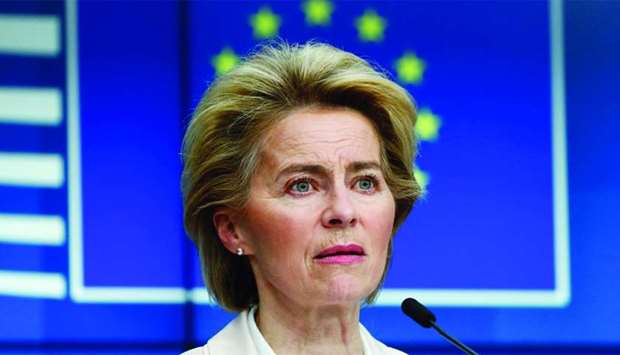The European Union on Thursday sharply criticised the US decision to restrict travel from most European countries to contain the coronavirus pandemic, and said the crisis required global cooperation not unilateral action.
The ban applies to any foreign passport holder who has been in the 26 country Schengen open border area within 14 days of their seeking admission into the United States.
The Schengen countries are: Austria, Belgium, Czech Republic, Denmark, Estonia, Finland, France, Germany, Greece, Hungary, Iceland, Italy, Latvia, Liechtenstein, Lithuania, Luxembourg, Malta, Netherlands, Norway, Poland, Portugal, Slovakia, Slovenia, Spain, Sweden, and Switzerland.
The ban does not apply to people from England, Ireland or Scotland, if they have not been in the Schengen countries in recent weeks.
"The free flow of people between the Schengen Area countries makes the task of managing the spread of the virus difficult," the White House proclamation said.
The ban applies to non-American citizens who have been in any of the 26 Schengen countries within 14 days of their planned entry into the Untied States.
The ban is not focused on citizens of those countries, but anyone who has been physically present in them.
European Commission President Ursula von der Leyen and European Council President Charles Michel said they disapproved of the US decision, which they said was "taken unilaterally and without consultation."
In a joint statement, they insisted Brussels was taking "strong" measures to limit the spread of the virus, despite Trump's claims in announcing a 30-day restriction on travel from Europe, except Britain and a few other countries.
US President Donald Trump, a frequent critic of the EU, defended his decision to impose the travel restrictions without consulting Brussels.
Speaking to reporters in the White House alongside Irish Prime Minister Leo Varadkar, he said the ban could be lengthened or shortened, and added that he had been unable to consult with the EU prior to announcing it on Wednesday evening in a televised address that shocked investors and travelers.
In the address, Trump said his government had been in frequent contact with US allies, but a EU diplomat told Reuters shortly after the announcement on Wednesday there had been no coordination or prior notification.
"There was no heads-up, no coordination as the president claimed," the diplomat said.
Trump also faulted Brussels for failing to restrict travel from China, where the virus originated, a decision that he said resulted in clusters of the disease in the United States being "seeded by travellers from Europe".
EU officials said they were taking "strong action to limit the spread of the virus," adding, "the coronavirus is a global crisis, not limited to any continent and it requires cooperation rather than unilateral action".
The US move poses a serious setback for efforts by Brussels to repair severely strained trade ties with Washington.
EU Trade Commissioner Phil Hogan on Wednesday cancelled a scheduled visit to Washington for next week, even before the restrictions were announced, citing escalating concerns about the pandemic.
Hogan, who previously served as the EU's farm chief, has made resetting strained EU-US economic relations a top priority, but there has been little visible progress to date.
An EU official said there were no current plans to reschedule a speech Hogan was due to deliver in Washington on Tuesday about his ideas for reforming global trading rules.
US citizens and permanent residents, spouses of US citizens or permanent residents, and the non-American parents and siblings of under-21 children who hold US citizenship will all be allowed to enter the United States, even if they had spent time recently in Schengen countries.



